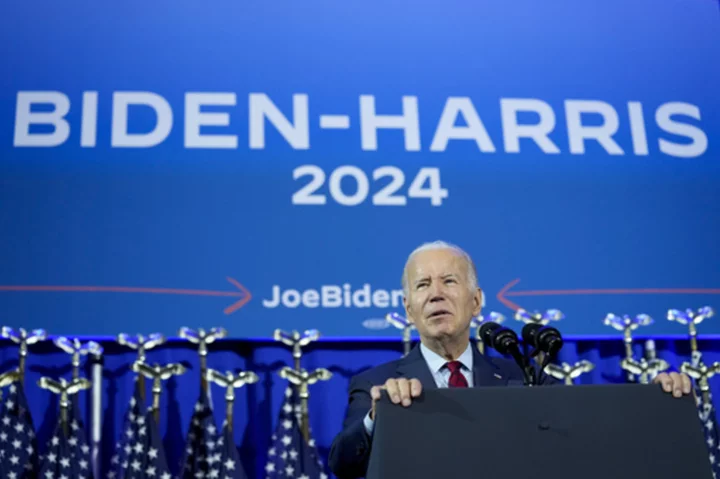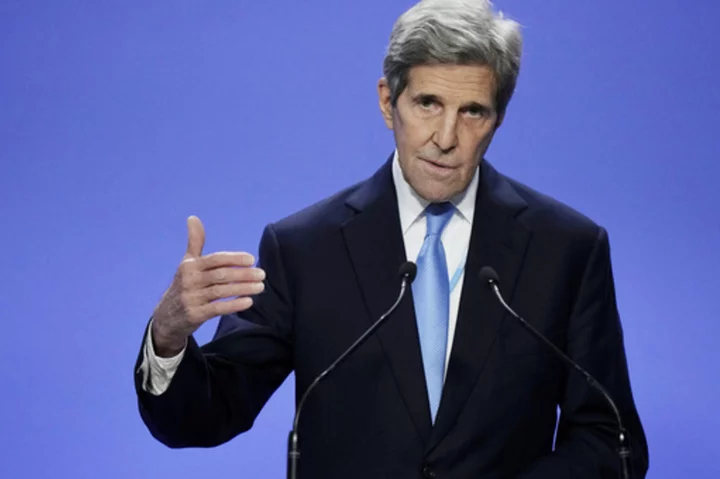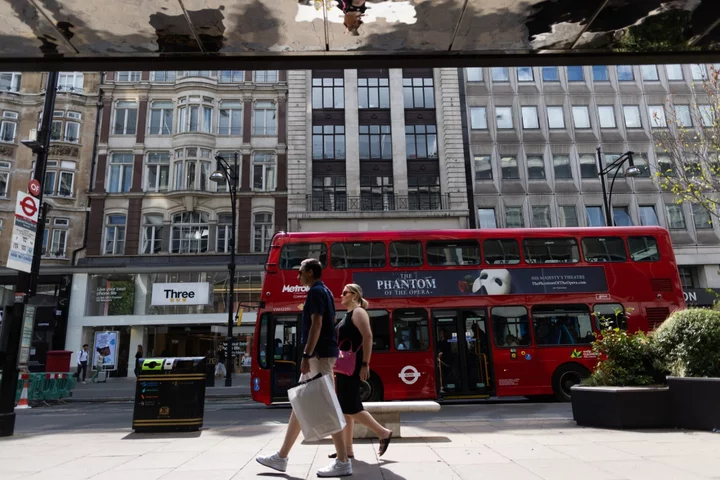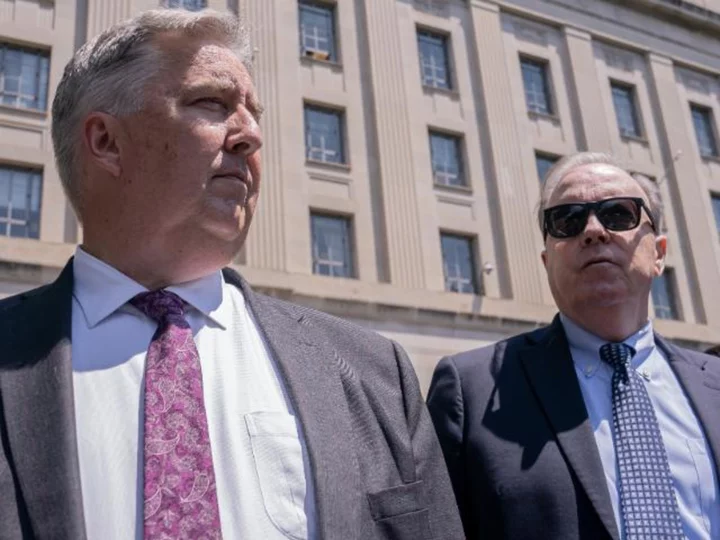WASHINGTON (AP) — New Hampshire is in open rebellion. Georgia is all but out.
South Carolina and Nevada are on board but face stiff Republican pushback. Michigan's compliance may mean having to cut the state legislative session short, despite Democrats controlling both chambers and the governor's mansion.
Then there's Iowa, which is looking for ways to still go first without violating party rules.
Months after the Democratic Party approved President Joe Biden's plan to overhaul its primary order to better reflect a deeply diverse voter base, implementing the revamped order has proven anything but simple. Party officials now expect the process to continue through the end of the year — even as the 2024 presidential race heats up all around it.
“Despite the fact that it looked like relatively smooth sailing for the president when he proposed it ... the kind of backlash you’re hearing, the reactions, are exactly what we would have expected," said David Redlawsk, chair of the political science department at the University of Delaware and co-author of the book “Why Iowa? How Caucuses and Sequential Elections Improve the Presidential Nominating Process.”
The DNC says it prepared for an arduous process, but is not too concerned by the uncertainty, in part because Biden faces only minor primary challengers in self-help author Marianne Williamson and anti-vaccine activist Robert F. Kennedy Jr.
Biden's political advisers say the president doesn't expect to campaign extensively in the Democratic primary and instead will focus on the general election. But the primary calendar drama might nonetheless prove a headache for Democrats who want to project unity ahead of 2024 and might spell trouble for 2028 — when the party has promised to revisit its primary calendar anew.
Jim Roosevelt, co-chairman of the DNC’s Rules and Bylaws Committee, said he “was not surprised” at the objections of Iowa and New Hampshire since they are losing their leadoff spots, and that the committee is “definitely able to work around” the protests of Republicans in places adjusting to new rules or new slots on the calendar.
“I think having a sitting president is the most likely time to make a fundamental change to make the process more representative,” said Roosevelt, who also noted that the party last enforced a reordering of its primary calendar ahead of a competitive presidential primary in 2008.
It will get that chance again, though, since a potential reorder next cycle will come when, no matter what happens in 2024, there won’t be an incumbent Democratic president seeking reelection.
Another long, contentious new calendar process then might mean uncertainty with real electoral consequences — perhaps even making it difficult for Democrats running in a competitive presidential primary to know where to campaign, hire staff and advertise. The party can try and mitigate that by starting its 2028 calendar discussions early, potentially even weeks after next year's election.
The prospect of another drawn-out fight won't deter the party, though: “Definitely we’ll see this again in 2028," Roosevelt said.
In the meantime, the DNC isn't planning to alter the 2024 plan it approved in February stripping Iowa's caucus of the leadoff spot it held since 1972, and replacing it with South Carolina, which is set to have its primary Feb. 3. Going second, three days later, were supposed to be New Hampshire and Nevada, which is scrapping its caucus in favor of a primary.
The new order had them being followed by Georgia's primary on Feb. 13 and Michigan's two weeks after that. Those states would precede most of the rest of the country, which would vote on Super Tuesday in early March — giving them enormous influence on deciding which primary candidates can make it that far.
But New Hampshire responded by pointing to its state law mandating that it hold the nation’s first presidential primary — which Iowa only circumvented for five decades because it held a caucus — and threatening to jump ahead.
Georgia, meanwhile, likely won't take its place in the new top 5 because the state's Republicans rejected calls to move their party's primary to comply with Democrats' new date.
While South Carolina Democrats are set to go first, the state's Republicans delayed their party's primary until three weeks later, on Feb. 24. In Nevada, Republicans have sued to maintain their party-run presidential caucus, even as the state shifts to a primary system. Michigan has also approved its new date, but its Legislature may adjourn early to make that work.
And Iowa has proposed holding a caucus before anyone else, yet may not release the results of its presidential contest until later in deference to new party rules.
This year's shakeup followed the 2020 Iowa caucus meltdown. Iowa responded by proposing new rules allowing Democrats to submit their presidential choices by mail, breaking with past caucus rules requiring in-person participation.
Scott Brennan, an Iowa attorney and member of the DNC’s rules committee, said his state “knew the deck was stacked against us” from the start of the primary calendar shakeup — but its Democrats have since attempted to avoid open defiance of national party plans.
“We’re trying to remain flexible as long as we can," Brennan said, "to see if there’s a way to fix this.”
Republicans are still leading off their 2024 primary with Iowa's caucus, and the Iowa GOP could set its caucus date next month. That would then allow Iowa Democrats to tell the DNC when it plans to hold its caucus, even if the presidential results aren't released until later.
Iowa Democrats hope their more flexible attitude could see the state let back into the Democratic primary's top 5, if Georgia and New Hampshire vacate their spots. That would mean Iowa filling a potential gap between when Nevada votes on Feb. 6 and Michigan does on Feb. 27 — through Roosevelt said such a scenario is unlikely.
“I give Iowa a lot of credit for trying to work flexibly,” he said. ”If Iowa were to find a way to fully comply with the new rules, that would be considered. Frankly I think it's too late for that.”
Roosevelt also noted that one of the reasons the largely white state was moved out of the No. 1 spot "was demographics, and that's not going to change.”
New Hampshire has struck a harsher tone, saying its Republican governor and GOP-controlled Legislature won't change state law requiring it to hold the nation's first primary.
“We don’t have a choice to delay the primary. Maybe Iowa's different," said New Hampshire Democratic National Committeeman Bill Shaheen.
If New Hampshire presses forward with its plan to go first, and Biden opts not to campaign there, one of his challengers could see a bump in support. That would be potentially embarrassing to the president, though Biden supporters have pointed to polling showing the state's primary remains far from really competitive.
“I don’t think the DNC is going to do anything that’s going to change what we’re going to do,” Shaheen said of the national party's continuing work to overhaul its primary. “We just don’t like getting pushed around much.”
Biden's reelection campaign has refused to discuss his primary challengers or whether they might be buoyed by success in an unsanctioned New Hampshire primary. Iowa Democrats, by contrast, have suggested they'll list Biden among the presidential preferences in their caucus whether he campaigns there or not — potentially sparing the president embarrassment there.
Redlawsk said the fact that Democrats have made it this far in their calendar shakeup means “the battle will continue, but I think it’s far more likely that change will now happen" and that the impact could be profound.
“These early states really do condition the campaign. The early states don’t guarantee a winner, but they tell us who is going to lose, at least in the first rounds,” Redlawsk said. “The winnowing is very likely to be different if the first state is South Carolina, or Nevada, or some combination, than if it were Iowa or New Hampshire.”









